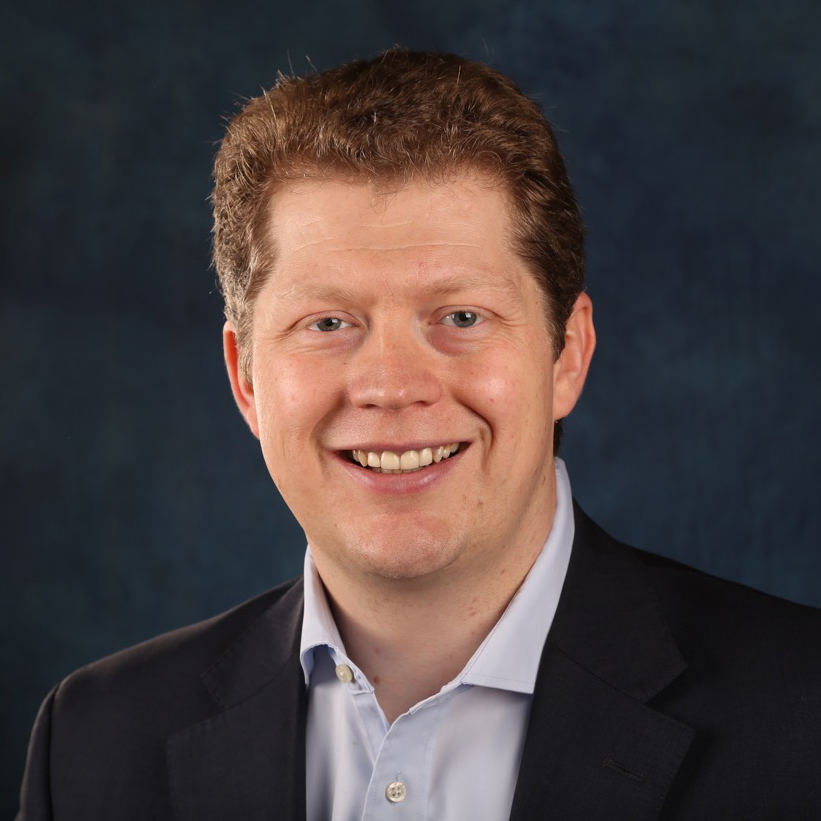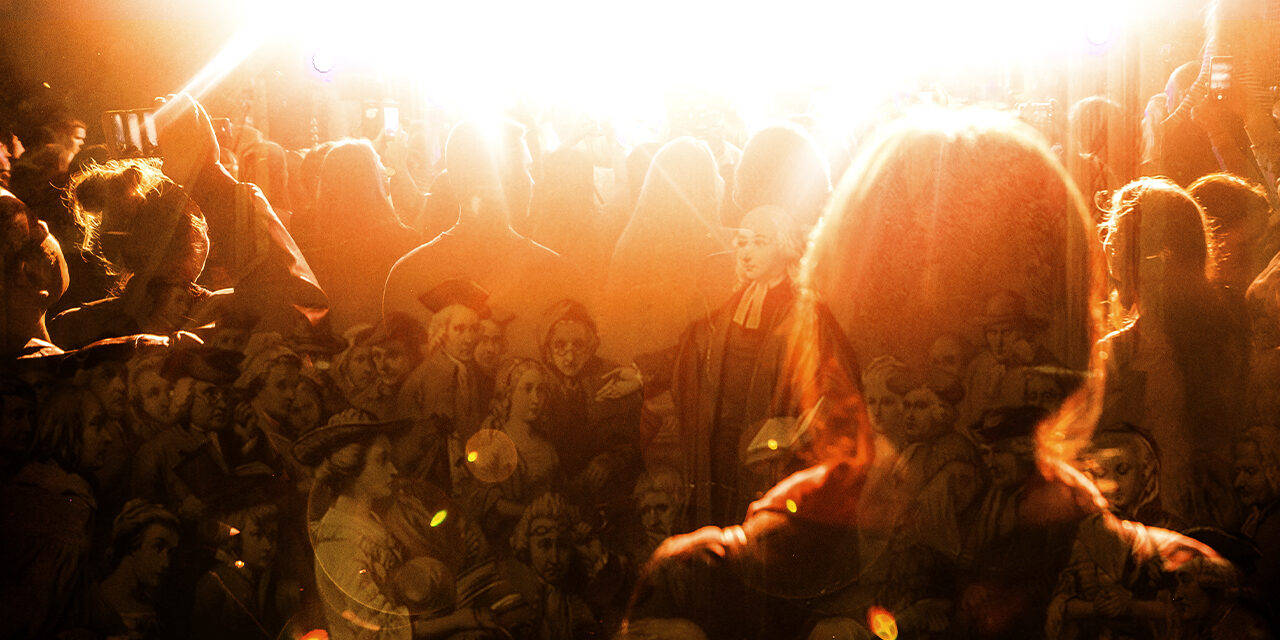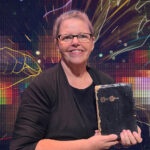
David A. Hull
David A. Hull, Ph.D., has been a pastor for almost twenty years, serving in the worlds of church and education. He is the lead pastor of Freedom Church Bristol, a Free Methodist Church UK congregation based in Kingswood, the birthplace of the Wesleyan revival. Passionate about seeking a rekindling of the Wesleyan flame, he is chair of Methodist Evangelicals Together and of Share Jesus International and is a member of the Council of the Evangelical Alliance. He is married to Sarah, and they have three young daughters.
By David A. Hull
When I was asked to write a piece for Light + Life, references to “the Asbury revival” were, for many, simply a footnote in history. It was revival that led to the foundation of Asbury University, and further revivals have followed. There are many people, still faithfully following Jesus all these years later, who look back on those revivals as seminal moments in their spiritual growth.
Yet, in the ensuing month since receiving the invitation to write, talk of “the Asbury revival” has resurfaced — not as fond recollections of an experience more than 50 or 70 years ago, but as a present reality. On Wednesday, Feb. 8, 2023, a chapel service concluded at Asbury University as the preacher, Zach Meerkreebs, left the platform, feeling that he had failed to hit the mark — a sentiment familiar to many preachers. He reportedly sent a text message to his wife, “Latest stinker. I’ll be home soon.”
Several students, however, remained in chapel and continued to sing in worship; others began to join them. The worship continued nonstop for over two weeks, in what the university has described as an unusual “outpouring” of the Holy Spirit. It finally culminated on Thursday, Feb. 23, in a prayer service that had already been months in the planning. That prayer service marked the 200th anniversary of the Collegiate Day of Prayer — for revival and awakening on college campuses in America — a movement that itself grew out of revival in New England’s Second Great Awakening.
Over those two weeks of outpouring, thousands traveled to Wilmore, Kentucky, to share in the experience. News of the event quickly spread around the world via social media, developing a hunger in the hearts of many for a similar move of God where they are.
A Truly Surprising Narrative
It is inspiring to hear accounts of moves of God around the world. They do indeed stir in our own hearts a hunger for awakening, renewal and revival.
_
“We do not know what ponderings, passions and prayers that account kindled in Wesley’s heart and mind, but I am sure it stirred a hunger for revival within him.”
_m
Before John Wesley experienced revival in England, he read, in October 1738, Jonathan Edwards’ account of revival in New England, America. He described the account as a “truly surprising narrative of the conversions lately wrought in and about the town of Northampton in New England,” adding the note in his Journal, “Surely, ‘this is the Lord’s doing and it is marvellous in our eyes!’” (John Wesley, Journal, Oct. 9, 1738). We do not know what ponderings, passions and prayers that account kindled in Wesley’s heart and mind, but I am sure it stirred a hunger for revival within him.
What we do know is that it would not be long before Wesley himself began to experience revival. As the year turned from 1738 to 1739, he gathered with many of his friends at the Moravian meeting house in Fetter Lane, London, to see in the new year with an all-night prayer meeting. His life would never be the same. He wrote in his journal:
“Mr. Hall, Kinchin, Ingham, Whitefield, Hutchins, and my brother Charles, were present at our love-feast in Fetter Lane, with about sixty of our brethren.
“About three in the morning, as we were continuing instant in prayer, the power of God came mightily upon us, insomuch that many cried out for exceeding joy, and many fell to the ground. As soon as we were recovered a little from that awe and amazement at the presence of his Majesty, we broke out with one voice, ‘We praise thee, O God; we acknowledge thee to be the Lord’” (Wesley, Journal, January 1, 1739).
Vain Words
Wesley’s quest for revival had begun with desperation even more intense, it seems, than that which Zach Meerkreebs felt as he left the platform at Asbury University. Wesley had returned from a missionary trip to America feeling an utter failure. Doubt and disappointment had characterised the trip from its beginning. No sooner had he arrived in Savannah, Georgia, in February 1736, then he had been asked by the Moravian leader Augustus Spangenberg, “Does the Spirit of God bear witness with your spirit, that you are a child of God?” Spangenberg was relentlessly persistent in his questioning. Wesley prevaricated before answering in the affirmative, but he added in his journal, “I fear they were vain words” (Wesley, Journal, February 7, 1736).
Returning to England in January 1738, he wrote in his journal, “I went to America, to convert the Indians; but O! who shall convert me?” The sense of despair continued throughout the following months until he went to St Paul’s Cathedral in London on the morning of May 24, 1738. The words of Psalm 130, sung by the choir, seemed perfectly to express the feeling of his own soul: “Out of the deep have I called unto thee, O Lord: Lord, hear my voice” (Coverdale/Book of Common Prayer).
_
“I felt I did trust in Christ, Christ alone for salvation.” – John Wesley
_m
That evening, he went “very unwillingly” to a meeting in Aldersgate Street and, there, he received the assurance of faith, the witness of the Spirit of which Spangenberg had spoken. He famously wrote in his journal: “I felt my heart strangely warmed. I felt I did trust in Christ, Christ alone for salvation; and an assurance was given me that He had taken away my sins, even mine, and saved me from the law of sin and death” (Wesley, Journal, May 24, 1738).
It was this experience that spurred him on to read Edwards’ account of revival in New England and that led Wesley to the all-night prayer meeting as the year turned from 1738 to 1739. As “the power of God came mightily upon” him that night and he stood “amazed at the presence of his Majesty,” a flame was kindled in his heart which would soon spread like wildfire in the greatest revival Britain has ever known, changing almost countless lives around the world.
As At the First
The fire thus ignited in Wesley’s heart brought him to Kingswood in Bristol, where he began to preach in the open air to the infamous miners at Hanham Mount on Sunday, April 8, 1739. The fire of revival began to spread.
_
“It seems they sensed that the Holy Spirit was no longer present with them in the way he had been before.”
_m
In June, just two months later, he received a letter in Bristol from his fellow Methodists in London, urging him to return. It seems they sensed that the Holy Spirit was no longer present with them in the way he had been before.
So Wesley returned to London, and he met again with his friends in Fetter Lane, the very same place in which they had gathered to see in the new year six months previously. He described the scene in his journal: They humbled themselves before God, confessing that they had grieved the Holy Spirit by their divisions, trusting in their own works rather than in Christ, and ceasing to grow in holiness. He then added, “In that hour, we found God with us as at the first. Some fell prostrate upon the ground; others burst out, as with one consent, into loud praise and thanksgiving; and many openly testified, there had been no such day as this since January the first preceding” (Wesley, Journal, June 16, 173).
An outpouring of the Holy Spirit was given at the beginning of the year, igniting revival, and then, six months later, another outpouring of the Holy Spirit was given. I find that very encouraging!
Seeking the Heart of God
How, then, are we to seek revival, an outpouring of the Spirit of God, the ignition of a Spirit-fueled movement, to borrow the theme of General Conference 2023? How are we to steward a present awakening, as this month’s Light + Life theme asks?
_
“As we discover His heart, He gives us His hand.”
_m
That, it seems to me, is what Wesley’s revival ministry was all about: teaching people to seek the Lord through the ordinary means of grace: prayer and fasting, Bible reading, receiving Holy Communion, sharing in purposeful Christian fellowship, engaging in acts of mercy. Those are the channels, given to us by God Himself, through which His Holy Spirit flows into our lives, the ways in which we deepen our discipleship, growing in grace, holiness and the knowledge of the Lord. That is the way in which Wesley himself sought revival in his despair, doubt and discouragement.
It is about seeking not the hand of the Lord made manifest in revival, but His heart in the ultimate relationship for which we were created. As we discover His heart, He gives us His hand – at times quite spectacularly and often unexpectedly. It is as we do the ordinary things that, occasionally, the Lord moves in an extraordinary way. That, it seems, from a distance of 300 years, is what happened in the Evangelical Revival, the Great Awakening.
That, it seems, from a distance of 4,000 miles, is what might have happened in the outpouring of the Holy Spirit at Asbury this year. There has been much excitement, and rightly so. There is a hunger to develop, and there will be lessons to learn. However, we should not necessarily seek simply to copy the experience of revival in Asbury in the hope that it will result in revival where we are.
What brought an outpouring of the Holy Spirit to Asbury? “The wind blows wherever it pleases. You hear its sound, but you cannot tell where it comes from or where it is going” (John 3:8). It has been a spontaneous move of the Spirit of God. It wasn’t spontaneous, free-flowing, endless worship that brought the outpouring of the Spirit — that was the result of the outpouring.
The extraordinary outpouring of the Holy Spirit followed an ordinary chapel service, as ordinary students gathered in worship — just as countless Christians around the world gather in worship every week — and as an ordinary preacher tried his best to be faithful in declaring the Word of God — as countless preachers seek to do Sunday by Sunday. As they engaged in the ordinary means of grace, the Lord met them in an extraordinary way. The Wind, it seems, was pleased to blow in a mighty gale.
_
“… let’s remember that revival often begins in desperation.”
_m
This is the Lord’s doing, and it is marvellous in our eyes! Let’s continue to seek His heart through the ordinary means of grace, trusting Him to move in extraordinary ways, as He pleases — and let’s remember that revival often begins in desperation.
“Lord, I have heard of your fame; I stand in awe of your deeds, Lord. Repeat them in our day, in our time make them known” (Habakkuk 3:2).
+

David A. Hull
David A. Hull, Ph.D., has been a pastor for almost twenty years, serving in the worlds of church and education. He is the lead pastor of Freedom Church Bristol, a Free Methodist Church UK congregation based in Kingswood, the birthplace of the Wesleyan revival. Passionate about seeking a rekindling of the Wesleyan flame, he is chair of Methodist Evangelicals Together and of Share Jesus International and is a member of the Council of the Evangelical Alliance. He is married to Sarah, and they have three young daughters.









